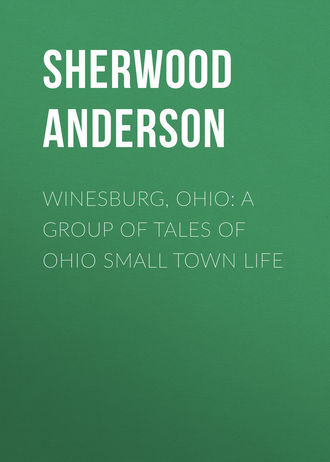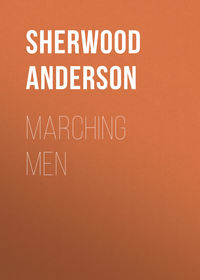 полная версия
полная версияWinesburg, Ohio: A Group of Tales of Ohio Small Town Life
Doctor Parcival shook with fright. "I have a presentiment," he declared emphatically. "It may be that what I am talking about will not occur this morning. It may be put off until tonight but I will be hanged. Everyone will get excited. I will be hanged to a lamp-post on Main Street."
Going to the door of his dirty office, Doctor Parcival looked timidly down the stairway leading to the street. When he returned the fright that had been in his eyes was beginning to be replaced by doubt. Coming on tiptoe across the room he tapped George Willard on the shoulder. "If not now, sometime," he whispered, shaking his head. "In the end I will be crucified, uselessly crucified."
Doctor Parcival began to plead with George Willard. "You must pay attention to me," he urged. "If something happens perhaps you will be able to write the book that I may never get written. The idea is very simple, so simple that if you are not careful you will forget it. It is this—that everyone in the world is Christ and they are all crucified. That's what I want to say. Don't you forget that. Whatever happens, don't you dare let yourself forget."
NOBODY KNOWS
Looking cautiously about, George Willard arose from his desk in the office of the Winesburg Eagle and went hurriedly out at the back door. The night was warm and cloudy and although it was not yet eight o'clock, the alleyway back of the Eagle office was pitch dark. A team of horses tied to a post somewhere in the darkness stamped on the hard-baked ground. A cat sprang from under George Willard's feet and ran away into the night. The young man was nervous. All day he had gone about his work like one dazed by a blow. In the alleyway he trembled as though with fright.
In the darkness George Willard walked along the alleyway, going carefully and cautiously. The back doors of the Winesburg stores were open and he could see men sitting about under the store lamps. In Myerbaum's Notion Store Mrs. Willy the saloon keeper's wife stood by the counter with a basket on her arm. Sid Green the clerk was waiting on her. He leaned over the counter and talked earnestly.
George Willard crouched and then jumped through the path of light that came out at the door. He began to run forward in the darkness. Behind Ed Griffith's saloon old Jerry Bird the town drunkard lay asleep on the ground. The runner stumbled over the sprawling legs. He laughed brokenly.
George Willard had set forth upon an adventure. All day he had been trying to make up his mind to go through with the adventure and now he was acting. In the office of the Winesburg Eagle he had been sitting since six o'clock trying to think.
There had been no decision. He had just jumped to his feet, hurried past Will Henderson who was reading proof in the printshop and started to run along the alleyway.
Through street after street went George Willard, avoiding the people who passed. He crossed and recrossed the road. When he passed a street lamp he pulled his hat down over his face. He did not dare think. In his mind there was a fear but it was a new kind of fear. He was afraid the adventure on which he had set out would be spoiled, that he would lose courage and turn back.
George Willard found Louise Trunnion in the kitchen of her father's house. She was washing dishes by the light of a kerosene lamp. There she stood behind the screen door in the little shedlike kitchen at the back of the house. George Willard stopped by a picket fence and tried to control the shaking of his body. Only a narrow potato patch separated him from the adventure. Five minutes passed before he felt sure enough of himself to call to her. "Louise! Oh, Louise!" he called. The cry stuck in his throat. His voice became a hoarse whisper.
Louise Trunnion came out across the potato patch holding the dish cloth in her hand. "How do you know I want to go out with you," she said sulkily. "What makes you so sure?"
George Willard did not answer. In silence the two stood in the darkness with the fence between them. "You go on along," she said. "Pa's in there. I'll come along. You wait by Williams' barn."
The young newspaper reporter had received a letter from Louise Trunnion. It had come that morning to the office of the Winesburg Eagle. The letter was brief. "I'm yours if you want me," it said. He thought it annoying that in the darkness by the fence she had pretended there was nothing between them. "She has a nerve! Well, gracious sakes, she has a nerve," he muttered as he went along the street and passed a row of vacant lots where corn grew. The corn was shoulder high and had been planted right down to the sidewalk.
When Louise Trunnion came out of the front door of her house she still wore the gingham dress in which she had been washing dishes. There was no hat on her head. The boy could see her standing with the doorknob in her hand talking to someone within, no doubt to old Jake Trunnion, her father. Old Jake was half deaf and she shouted. The door closed and everything was dark and silent in the little side street. George Willard trembled more violently than ever.
In the shadows by Williams' barn George and Louise stood, not daring to talk. She was not particularly comely and there was a black smudge on the side of her nose. George thought she must have rubbed her nose with her finger after she had been handling some of the kitchen pots.
The young man began to laugh nervously. "It's warm," he said. He wanted to touch her with his hand. "I'm not very bold," he thought. Just to touch the folds of the soiled gingham dress would, he decided, be an exquisite pleasure. She began to quibble. "You think you're better than I am. Don't tell me, I guess I know," she said drawing closer to him.
A flood of words burst from George Willard. He remembered the look that had lurked in the girl's eyes when they had met on the streets and thought of the note she had written. Doubt left him. The whispered tales concerning her that had gone about town gave him confidence. He became wholly the male, bold and aggressive. In his heart there was no sympathy for her. "Ah, come on, it'll be all right. There won't be anyone know anything. How can they know?" he urged.
They began to walk along a narrow brick sidewalk between the cracks of which tall weeds grew. Some of the bricks were missing and the sidewalk was rough and irregular. He took hold of her hand that was also rough and thought it delightfully small. "I can't go far," she said and her voice was quiet, unperturbed.
They crossed a bridge that ran over a tiny stream and passed another vacant lot in which corn grew. The street ended. In the path at the side of the road they were compelled to walk one behind the other. Will Overton's berry field lay beside the road and there was a pile of boards. "Will is going to build a shed to store berry crates here," said George and they sat down upon the boards.
* * *
When George Willard got back into Main Street it was past ten o'clock and had begun to rain. Three times he walked up and down the length of Main Street. Sylvester West's Drug Store was still open and he went in and bought a cigar. When Shorty Crandall the clerk came out at the door with him he was pleased. For five minutes the two stood in the shelter of the store awning and talked. George Willard felt satisfied. He had wanted more than anything else to talk to some man. Around a corner toward the New Willard House he went whistling softly.
On the sidewalk at the side of Winney's Dry Goods Store where there was a high board fence covered with circus pictures, he stopped whistling and stood perfectly still in the darkness, attentive, listening as though for a voice calling his name. Then again he laughed nervously. "She hasn't got anything on me. Nobody knows," he muttered doggedly and went on his way.
GODLINESS
A Tale in Four Parts
There were always three or four old people sitting on the front porch of the house or puttering about the garden of the Bentley farm. Three of the old people were women and sisters to Jesse. They were a colorless, soft voiced lot. Then there was a silent old man with thin white hair who was Jesse's uncle.
The farmhouse was built of wood, a board outer-covering over a framework of logs. It was in reality not one house but a cluster of houses joined together in a rather haphazard manner. Inside, the place was full of surprises. One went up steps from the living room into the dining room and there were always steps to be ascended or descended in passing from one room to another. At meal times the place was like a beehive. At one moment all was quiet, then doors began to open, feet clattered on stairs, a murmur of soft voices arose and people appeared from a dozen obscure corners.
Besides the old people, already mentioned, many others lived in the Bentley house. There were four hired men, a woman named Aunt Callie Beebe, who was in charge of the housekeeping, a dull-witted girl named Eliza Stoughton, who made beds and helped with the milking, a boy who worked in the stables, and Jesse Bentley himself, the owner and overlord of it all.
By the time the American Civil War had been over for twenty years, that part of Northern Ohio where the Bentley farms lay had begun to emerge from pioneer life. Jesse then owned machinery for harvesting grain. He had built modern barns and most of his land was drained with carefully laid tile drain, but in order to understand the man we will have to go back to an earlier day.
The Bentley family had been in Northern Ohio for several generations before Jesse's time. They came from New York State and took up land when the country was new and land could be had at a low price. For a long time they, in common with all the other Middle Western people, were very poor. The land they had settled upon was heavily wooded and covered with fallen logs and underbrush. After the long hard labor of clearing these away and cutting the timber, there were still the stumps to be reckoned with. Plows run through the fields caught on hidden roots, stones lay all about, on the low places water gathered, and the young corn turned yellow, sickened and died.
When Jesse Bentley's father and brothers had come into their ownership of the place, much of the harder part of the work of clearing had been done, but they clung to old traditions and worked like driven animals. They lived as practically all of the farming people of the time lived. In the spring and through most of the winter the highways leading into the town of Winesburg were a sea of mud. The four young men of the family worked hard all day in the fields, they ate heavily of coarse, greasy food, and at night slept like tired beasts on beds of straw. Into their lives came little that was not coarse and brutal and outwardly they were themselves coarse and brutal. On Saturday afternoons they hitched a team of horses to a three-seated wagon and went off to town. In town they stood about the stoves in the stores talking to other farmers or to the store keepers. They were dressed in overalls and in the winter wore heavy coats that were flecked with mud. Their hands as they stretched them out to the heat of the stoves were cracked and red. It was difficult for them to talk and so they for the most part kept silent. When they had bought meat, flour, sugar, and salt, they went into one of the Winesburg saloons and drank beer. Under the influence of drink the naturally strong lusts of their natures, kept suppressed by the heroic labor of breaking up new ground, were released. A kind of crude and animal-like poetic fervor took possession of them. On the road home they stood up on the wagon seats and shouted at the stars. Sometimes they fought long and bitterly and at other times they broke forth into songs. Once Enoch Bentley, the older one of the boys, struck his father, old Tom Bentley, with the butt of a teamster's whip, and the old man seemed likely to die. For days Enoch lay hid in the straw in the loft of the stable ready to flee if the result of his momentary passion turned out to be murder. He was kept alive with food brought by his mother, who also kept him informed of the injured man's condition. When all turned out well he emerged from his hiding place and went back to the work of clearing land as though nothing had happened.
* * *
The Civil War brought a sharp turn to the fortunes of the Bentleys and was responsible for the rise of the youngest son, Jesse. Enoch, Edward, Harry, and Will Bentley all enlisted and before the long war ended they were all killed. For a time after they went away to the South, old Tom tried to run the place, but he was not successful. When the last of the four had been killed he sent word to Jesse that he would have to come home.
Then the mother, who had not been well for a year, died suddenly, and the father became altogether discouraged. He talked of selling the farm and moving into town. All day he went about shaking his head and muttering. The work in the fields was neglected and weeds grew high in the corn. Old Tom hired men but he did not use them intelligently. When they had gone away to the fields in the morning he wandered into the woods and sat down on a log. Sometimes he forgot to come home at night and one of the daughters had to go in search of him.
When Jesse Bentley came home to the farm and began to take charge of things he was a slight, sensitive-looking man of twenty-two. At eighteen he had left home to go to school to become a scholar and eventually to become a minister of the Presbyterian Church. All through his boyhood he had been what in our country was called an "odd sheep" and had not got on with his brothers. Of all the family only his mother had understood him and she was now dead. When he came home to take charge of the farm, that had at that time grown to more than six hundred acres, everyone on the farms about and in the nearby town of Winesburg smiled at the idea of his trying to handle the work that had been done by his four strong brothers.
There was indeed good cause to smile. By the standards of his day Jesse did not look like a man at all. He was small and very slender and womanish of body and, true to the traditions of young ministers, wore a long black coat and a narrow black string tie. The neighbors were amused when they saw him, after the years away, and they were even more amused when they saw the woman he had married in the city.
As a matter of fact, Jesse's wife did soon go under. That was perhaps Jesse's fault. A farm in Northern Ohio in the hard years after the Civil War was no place for a delicate woman, and Katherine Bentley was delicate. Jesse was hard with her as he was with everybody about him in those days. She tried to do such work as all the neighbor women about her did and he let her go on without interference. She helped to do the milking and did part of the housework; she made the beds for the men and prepared their food. For a year she worked every day from sunrise until late at night and then after giving birth to a child she died.
As for Jesse Bentley—although he was a delicately built man there was something within him that could not easily be killed. He had brown curly hair and grey eyes that were at times hard and direct, at times wavering and uncertain. Not only was he slender but he was also short of stature. His mouth was like the mouth of a sensitive and very determined child. Jesse Bentley was a fanatic. He was a man born out of his time and place and for this he suffered and made others suffer. Never did he succeed in getting what he wanted out of life and he did not know what he wanted. Within a very short time after he came home to the Bentley farm he made everyone there a little afraid of him, and his wife, who should have been close to him as his mother had been, was afraid also. At the end of two weeks after his coming, old Tom Bentley made over to him the entire ownership of the place and retired into the background. Everyone retired into the background. In spite of his youth and inexperience, Jesse had the trick of mastering the souls of his people. He was so in earnest in everything he did and said that no one understood him. He made everyone on the farm work as they had never worked before and yet there was no joy in the work. If things went well they went well for Jesse and never for the people who were his dependents. Like a thousand other strong men who have come into the world here in America in these later times, Jesse was but half strong. He could master others but he could not master himself. The running of the farm as it had never been run before was easy for him. When he came home from Cleveland where he had been in school, he shut himself off from all of his people and began to make plans. He thought about the farm night and day and that made him successful. Other men on the farms about him worked too hard and were too fired to think, but to think of the farm and to be everlastingly making plans for its success was a relief to Jesse. It partially satisfied something in his passionate nature. Immediately after he came home he had a wing built on to the old house and in a large room facing the west he had windows that looked into the barnyard and other windows that looked off across the fields. By the window he sat down to think. Hour after hour and day after day he sat and looked over the land and thought out his new place in life. The passionate burning thing in his nature flamed up and his eyes became hard. He wanted to make the farm produce as no farm in his state had ever produced before and then he wanted something else. It was the indefinable hunger within that made his eyes waver and that kept him always more and more silent before people. He would have given much to achieve peace and in him was a fear that peace was the thing he could not achieve.
All over his body Jesse Bentley was alive. In his small frame was gathered the force of a long line of strong men. He had always been extraordinarily alive when he was a small boy on the farm and later when he was a young man in school. In the school he had studied and thought of God and the Bible with his whole mind and heart. As time passed and he grew to know people better, he began to think of himself as an extraordinary man, one set apart from his fellows. He wanted terribly to make his life a thing of great importance, and as he looked about at his fellow men and saw how like clods they lived it seemed to him that he could not bear to become also such a clod. Although in his absorption in himself and in his own destiny he was blind to the fact that his young wife was doing a strong woman's work even after she had become large with child and that she was killing herself in his service, he did not intend to be unkind to her. When his father, who was old and twisted with toil, made over to him the ownership of the farm and seemed content to creep away to a corner and wait for death, he shrugged his shoulders and dismissed the old man from his mind.
In the room by the window overlooking the land that had come down to him sat Jesse thinking of his own affairs. In the stables he could hear the tramping of his horses and the restless movement of his cattle. Away in the fields he could see other cattle wandering over green hills. The voices of men, his men who worked for him, came in to him through the window. From the milkhouse there was the steady thump, thump of a churn being manipulated by the half-witted girl, Eliza Stoughton. Jesse's mind went back to the men of Old Testament days who had also owned lands and herds. He remembered how God had come down out of the skies and talked to these men and he wanted God to notice and to talk to him also. A kind of feverish boyish eagerness to in some way achieve in his own life the flavor of significance that had hung over these men took possession of him. Being a prayerful man he spoke of the matter aloud to God and the sound of his own words strengthened and fed his eagerness.
"I am a new kind of man come into possession of these fields," he declared. "Look upon me, O God, and look Thou also upon my neighbors and all the men who have gone before me here! O God, create in me another Jesse, like that one of old, to rule over men and to be the father of sons who shall be rulers!" Jesse grew excited as he talked aloud and jumping to his feet walked up and down in the room. In fancy he saw himself living in old times and among old peoples. The land that lay stretched out before him became of vast significance, a place peopled by his fancy with a new race of men sprung from himself. It seemed to him that in his day as in those other and older days, kingdoms might be created and new impulses given to the lives of men by the power of God speaking through a chosen servant. He longed to be such a servant. "It is God's work I have come to the land to do," he declared in a loud voice and his short figure straightened and he thought that something like a halo of Godly approval hung over him.
* * *
It will perhaps be somewhat difficult for the men and women of a later day to understand Jesse Bentley. In the last fifty years a vast change has taken place in the lives of our people. A revolution has in fact taken place. The coming of industrialism, attended by all the roar and rattle of affairs, the shrill cries of millions of new voices that have come among us from overseas, the going and coming of trains, the growth of cities, the building of the inter-urban car lines that weave in and out of towns and past farmhouses, and now in these later days the coming of the automobiles has worked a tremendous change in the lives and in the habits of thought of our people of Mid-America. Books, badly imagined and written though they may be in the hurry of our times, are in every household, magazines circulate by the millions of copies, newspapers are everywhere. In our day a farmer standing by the stove in the store in his village has his mind filled to overflowing with the words of other men. The newspapers and the magazines have pumped him full. Much of the old brutal ignorance that had in it also a kind of beautiful childlike innocence is gone forever. The farmer by the stove is brother to the men of the cities, and if you listen you will find him talking as glibly and as senselessly as the best city man of us all.
In Jesse Bentley's time and in the country districts of the whole Middle West in the years after the Civil War it was not so. Men labored too hard and were too tired to read. In them was no desire for words printed upon paper. As they worked in the fields, vague, half-formed thoughts took possession of them. They believed in God and in God's power to control their lives. In the little Protestant churches they gathered on Sunday to hear of God and his works. The churches were the center of the social and intellectual life of the times. The figure of God was big in the hearts of men.
And so, having been born an imaginative child and having within him a great intellectual eagerness, Jesse Bentley had turned wholeheartedly toward God. When the war took his brothers away, he saw the hand of God in that. When his father became ill and could no longer attend to the running of the farm, he took that also as a sign from God. In the city, when the word came to him, he walked about at night through the streets thinking of the matter and when he had come home and had got the work on the farm well under way, he went again at night to walk through the forests and over the low hills and to think of God.
As he walked the importance of his own figure in some divine plan grew in his mind. He grew avaricious and was impatient that the farm contained only six hundred acres. Kneeling in a fence corner at the edge of some meadow, he sent his voice abroad into the silence and looking up he saw the stars shining down at him.
One evening, some months after his father's death, and when his wife Katherine was expecting at any moment to be laid abed of childbirth, Jesse left his house and went for a long walk. The Bentley farm was situated in a tiny valley watered by Wine Creek, and Jesse walked along the banks of the stream to the end of his own land and on through the fields of his neighbors. As he walked the valley broadened and then narrowed again. Great open stretches of field and wood lay before him. The moon came out from behind clouds, and, climbing a low hill, he sat down to think.
Jesse thought that as the true servant of God the entire stretch of country through which he had walked should have come into his possession. He thought of his dead brothers and blamed them that they had not worked harder and achieved more. Before him in the moonlight the tiny stream ran down over stones, and he began to think of the men of old times who like himself had owned flocks and lands.






